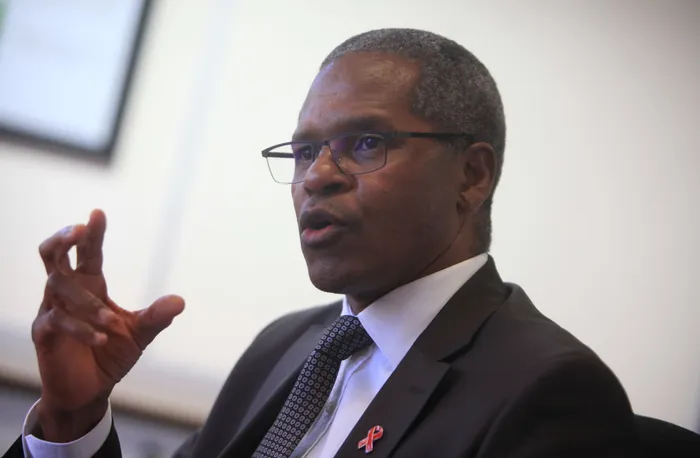IFP opposes multibillion-rand KZN government precinct development in favour of existing Ulundi precinct

IFP President Velenkosini Hlabisa. Picture: Nhlanhla Phillips/African News Agency (ANA) Archives
Durban - The IFP in KwaZulu-Natal has opposed the mooted R6.8 billion development of the KwaZulu-Natal government precinct in Pietermaritzburg and instead called for the use of the Ulundi government precinct which is already in existence.
In a media briefing on Tuesday, IFP leaders in the province outlined why it did not make sense for the provincial government to forge ahead with the development of the Pietermaritzburg government precinct.
The IFP said that while noting that this precinct development was doomed even before it starts, because of its continued recurrence in the KZN State of the Province Addresses, the IFP felt that it was about time to put matters into proper perspective for the people of KZN.
Breaking down the cost for the precinct’s development, IFP president Velenkosini Hlabisa said that a presentation proposed by KZN Department of Public Works in February 2020 affirmed that the development was going to take place in three phases.
The first phase, from 2020 to 2023, would see site development, the legislature, archives, a retail centre and conference centre to the tune of R3.1 billion, with the sources set to fund this phase including the KZN government’s own funds of R350 million, sale of properties amounting to R120m, savings from equitable share and an foreign direct investment loan of R2.471 billion.
The second phase, expected to begin in 2023 and run through to 2026, is projected to cost R1.8bn, emanating from foreign direct investment, and will see the development of the Office of the Premier, Department of Economic Development Tourism and Environmental Affairs, Department of Agriculture and Rural Development and the Department of Education office spaces.
The third phase, from 2026 to 2028, will see offices of the departments of Social Development, Cogta, Community Safety and Liaison, Human Settlements, Sport and Recreation, Treasury, and Arts and Culture, with the source of funding another R1.8bn from a direct foreign investment loan.
Hlabisa said that the Cogta presentation had stipulated that the total development costs for the project would be R6.817bn, and the market value of the precinct after construction would be R11bn.
“Government claims that accommodation rental for offices in 20 years in Pietermaritzburg (from 2004) would have arrived at R5.865bn for all departments and the legislature. Currently, rental for accommodation and office space in Pietermaritzburg is at R150.4m a year, excluding other costs.
“South Africa does not have money. Likewise KwaZulu-Natal does not have money, especially after the socio-economically devastating effects of both Covid-19 and the July 2021 unrest in the province,” Hlabisa said.
In turn, Hlabisa and the IFP proposed the honouring of the 1994 agreement by political parties in the provincial legislature – that Ulundi and Pietermaritzburg would be utilised interchangeably for the sittings, and committees of the legislature.
“This was the most sensible agreement for the resolution of this problem. When the ANC gained majority in the legislature in the 2004 elections, they took a decision to write off Ulundi and relocated everything to Pietermaritzburg, both legislature and government offices.
“The IFP acknowledges that both Ulundi and Pietermaritzburg are of historical significance to various sections of our community in the province. Thus, none should be treated as superior to the other as per the 1994 agreement,” Hlabisa said.
He added that the government already owned a state-of-the-art facility in Ulundi which was inherited from the erstwhile KwaZulu government, and the facility had enough space for the legislature sittings and offices.
“The IFP does not want to pit Pietermaritzburg against Ulundi, and vice versa. We cannot duplicate in Pietermaritzburg what already exists at Ulundi. There is no money to waste.
“As we stated in the debate of the state of the province 2022, the IFP will vigorously campaign for the province to retain and protect the significance of our heritage in the monarchy, and it cannot be that the hard-earned gains of our democracy in the province gets reversed by a democratic dispensation of our times,” Hlabisa said.
Department of Human Settlements and Public Works MEC Jomo Sibiya said that the purpose of the precinct was to make the government accessible to the people and that the provincial precinct will not be a facility that is intimidating or inaccessible to the people.
“The concept is being developed to ensure a vibrant and engaging environment so that people feel welcome and can be assisted with their challenges,” Sibiya said.
The figures laid out by Sibiya for the precinct’s development are lower in comparison to the R6.8bn, as they stand at R2.9bn.
He said that the KZN provincial precinct project was not funded as internal resources were being utilised to compile the master plan and the concept.
“It is highlighted that by prioritising and utilising internal resources, the department has effectively avoided incurring approximately R130m in costs that would ordinarily have been incurred had the function been outsourced.
“It is confirmed that additional funding was approved to facilitate the engagement of the specialist resources required to undertake the statutory compliance and financial modelling,” Sibiya said.
samkelo.mtshali@inl.co.za
Political Bureau
Related Topics: